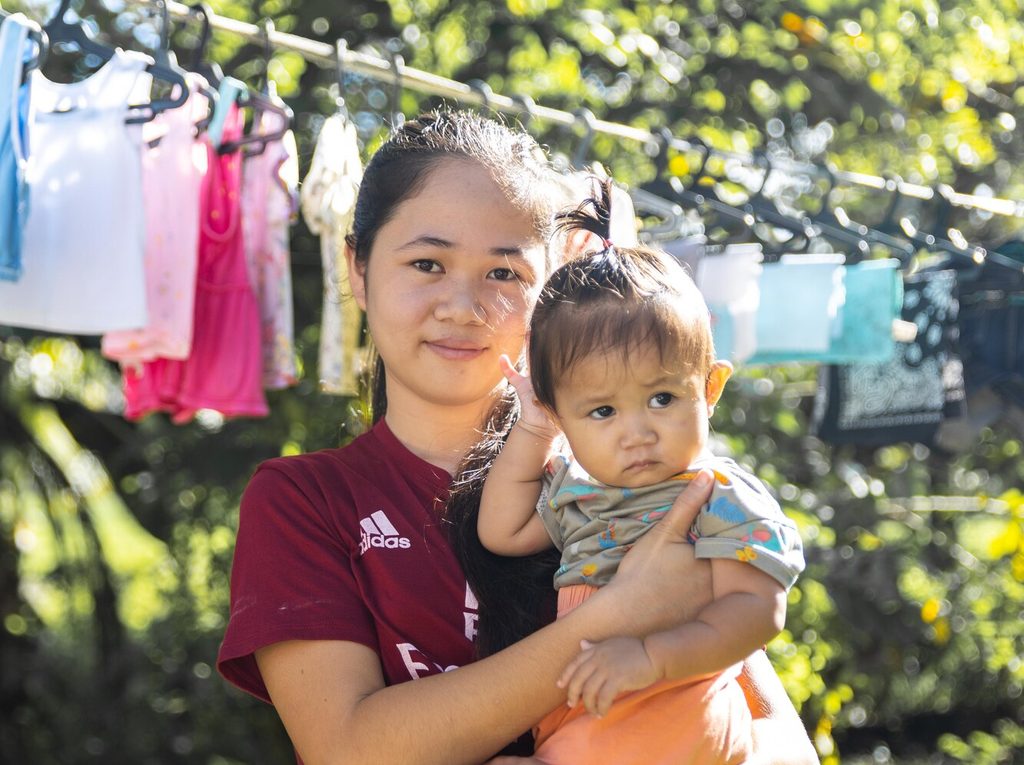Maham has hope for reproductive rights in the USA
Maham is exploring how she can use her leadership skills to effect change in Texas, after Roe v Wade was overturned in September 2021.
Adolescent pregnancies are a global issue but most often occur in poorer and marginalised communities. Many girls face considerable pressure to marry early and become mothers while they are still children themselves.
Teenage pregnancy increases when girls are denied the right to make decisions about their sexual and reproductive health and well-being.
Girls must be able to make their own decisions about their bodies and futures, understand the effects of teenage pregnancy, and have access to appropriate healthcare services and comprehensive sexuality education.

Pictured: Gwyn, 19, from Philippines, with her baby Lesha. Photo credit: Plan International / Michael Perfecto.
Approximately 90% of births to girls aged 15-19 in developing countries occur within early marriage where there is often an imbalance of power, no access to contraception and pressure on girls to prove their fertility.
Factors such as parental income and the extent of a girl’s education also contribute. Girls who have received minimal education are 5 times more likely to become a mother than those with higher levels of education. Pregnant girls often drop out of school, limiting opportunities for future employment and perpetuating the cycle of poverty. In many cases, girls perceive pregnancy to be a better option than continuing their education.
In addition, the unique risks faced by girls during emergencies increase the chances of them becoming pregnant. Factors include the desire to compensate for the loss of a child, reduced access to information and contraception and increased sexual violence.
Nester, 24, is a trained expert in sexual and reproductive health and rights, who has helped up to 500 young people in Malawi access contraception, support and vital sexual health information.
Adolescent pregnancy remains a major contributor to maternal and child mortality. Complications relating to pregnancy and childbirth are the leading cause of death for girls aged 15-19 globally. Pregnant girls and adolescents also face other health risks and complications due to their immature bodies. Babies born to younger mothers are also at greater risk.
For many adolescents, pregnancy and childbirth are neither planned, nor wanted. In countries where abortion is prohibited or highly restricted, adolescents typically resort to unsafe abortion, putting their health and lives at risk. Some 3.9 million unsafe abortions occur each year to girls aged 15-19 in developing regions.
Adolescent pregnancy can also have negative social and economic effects on girls, their families and communities. Unmarried pregnant adolescents may face stigma or rejection by parents and peers as well as threats of violence. Girls who become pregnant before age 18 are also more likely to experience violence within a marriage or partnership.
We are committed to tackling adolescent pregnancy, especially among younger adolescents (aged 10-14) who are most at risk and yet often overlooked. We also support girls who have already become mothers.
By raising girls’ awareness of their sexual and reproductive health and rights, protecting them from abuse and connecting them with education and health services, we support the key decisions they make about their futures and bodies.
We call on governments to strengthen national health systems, implement comprehensive education on sexuality and relationships in and out of schools, and provide affordable, safe contraception to tackle the root causes of adolescent pregnancy. We also demand governments do more to support pregnant girls and young mothers to continue and complete their education.
* Plan International is not responsible for the content of other sites.